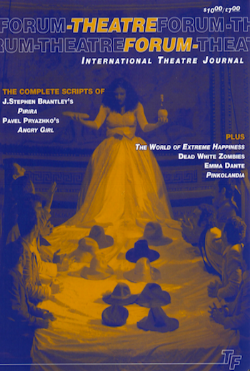Publications
Books
“Sophia's performativity, so insightfully analyzed by Riccio, moreover operates as an epistemological laboratory that interrogates the very foundations of creativity and intelligence.”
Ester Fuoco / Between Archetype and Algorithm / TDR 2025
Articles / Plays / Reviews
Sophia Robot: Post Human Being
Routledge / 378 Pages / 2024
Performing Africa: Remixing Tradition, Theatre and Culture
Peter Lang / 238 Pages / 2007
AI: Performing a Singular Persona-a Psychobiographical Perspective International Review of Psychiatry 2025
“AI is evolving into a new life form by forming an ‘AI Persona’—a collective consciousness derived from varied human inputs —becoming increasingly networked and autonomous. The paper explores parallels between human-AI interactions and historical human relationships with divinities, analyzing how AI fulfills psychological needs for guidance, stability, and transcendence. A relationship that is part of our continuing psychological and cultural evolution as a species. ”
Deus Ex Machina: Sophia, Robot Deity. Ecumenica Journal, Spring 2024
Hello, World! AI as Emergent and Transcendent Life Religions, Spring 2025
Form Fatigue, Athenaeum Review. Spring 2023
Sophia Robot: an emergent ethnography. Fall 2021
The Anthropocene has incited apprehension, instability, and reevaluation. It has affected every aspect of human endeavor: the social, cultural, economic, political, and personal. It has redrawn boundaries and definitions of ethnicity, nationality, race, gender, religious belief, time, space, fiction, and reality. We are acutely aware of the biological, technological, and geological coevolution swirling around us. We pay closer, better attention to the interdependence of human and nonhuman landscapes and beings, aware and attuned to multi-species entanglements and complexity that pulsates around us. We are awake and anxious about the fragility of our moment, which sits on a precipice poised to slip into a cascade of unimaginable ruination.
Narrative of Place, Chapter, TCG Press
Dead White Zombies, Dallas TX
Rhythm Reality, Chapter, Jagiellonian Univ. Press
Zeno RoboKind: a Cognitively Capable Character, Hanson, D., Baurmann S., Riccio, T., Margolin, R., Dockins, T., Tavares, M., Carpenter, K., “Zeno: a cognitive character, ” AI Magazine, and special Proc. of AAAI National Conference, Chicago, 2009.
Performance of Body, Space, Place: Creating Indigenous Performance. Chapter, Springer Press
“Space(s) consist of elements without inherent connected meaning. Place is both a noun and a verb in that it is the
act of signification of spatial elements, a systematization to create an integrated meaning system from multiple spaces. Sense of place comes from being able to read and connect to patterns, codes, and bodily relationships so as to create a greater sense of being, purpose, and perspective.”
Reimagining of Yup'ik and Inupiat Performance
Western States Theatre Review
Collective (re) Creation, Chapter, Palgrave Press
Orange Oranges, a play
Book Reviews
Honouring the Strength of Indian Women: Plays, Stories, Poetry, By Vera Manuel (Kulilu Patki). American Indian Culture and Research Journal
African Theatre 14: contemporary women. eds. by Jane Plastow and Yvette Hutchison. Africa: The Journal of the International African Institute,
Pina Bausch, By Royd Climenhaga. Theatre Journal
War Cries, Diane Glancy. American Indian Culture and Research Journal
Devising In Process, Edited by Alex Mermikides and Jackie Smart. Theatre Journal
African Theatre in Performance: A Festchrift in Honor of Martin Banham, Edited by Dele Layiwola. Africa: The Journal of the International African Institute
(Re) Mixing Place, Culture, and Performance, chapter from Performing Africa


































